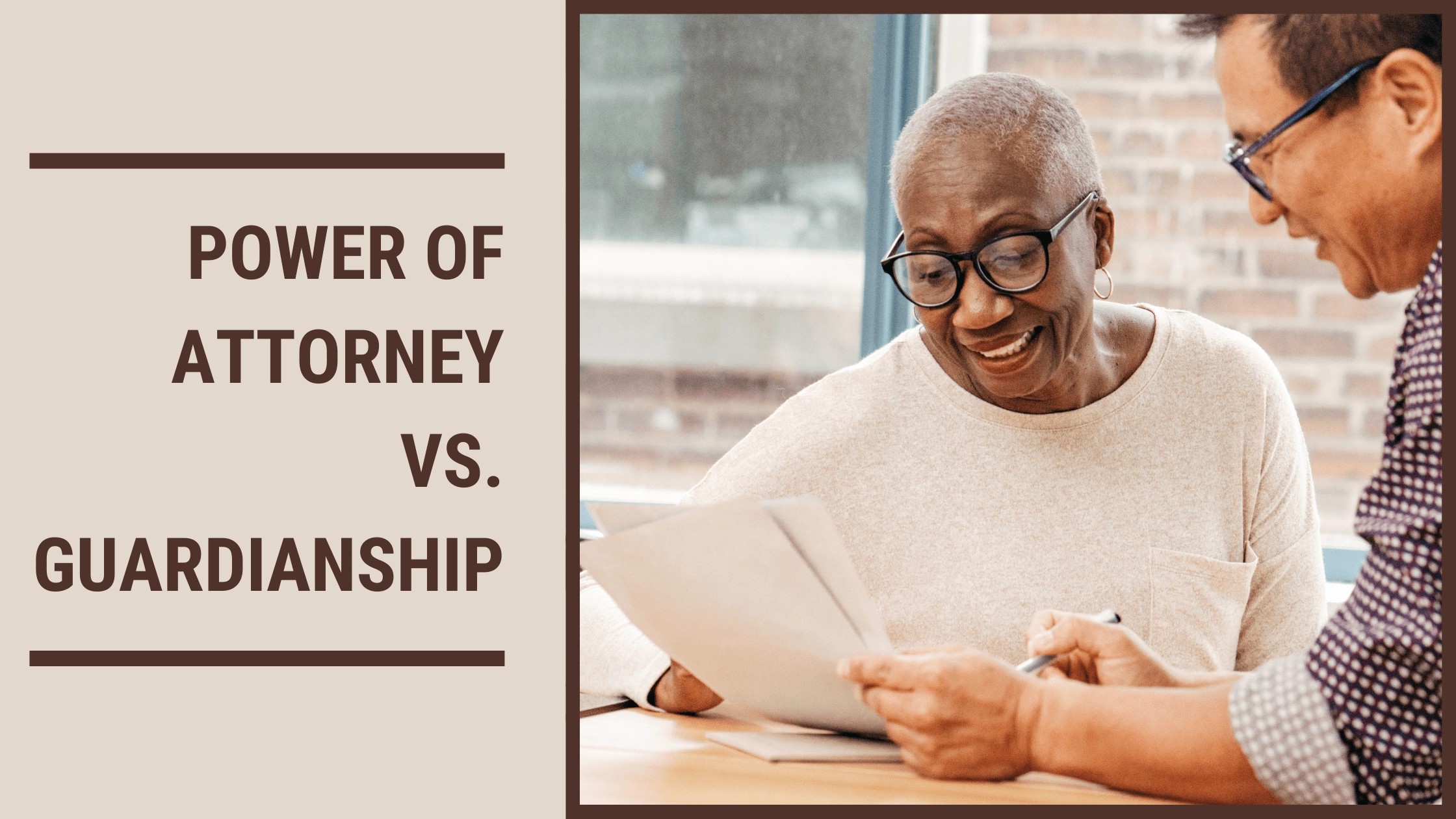Let’s say a close relative has health issues and is unable to handle their affairs. Though you’re not sure how to go, you want to assist. Perhaps you are asking yourself, “When is a power of attorney vs. guardianship necessary?”
This blog article explores the differences between power of attorney and guardianship, their requirements, and how to choose the appropriate option for a specific situation.
Power of Attorney: Types and Definition
With a power of attorney, one person (the grantor) can give another (the attorney-in-fact) legal and financial authority to manage their finances and legal matters.
There are several kinds of power of attorney, and each has certain duties and restrictions. For instance, a medical power of attorney empowers the designated individual to make decisions about the grantor’s medical treatment. However, if the grantor becomes incompetent, a durable power of attorney grants the attorney the authority to manage the grantor’s financial and legal affairs.
It’s critical to specify the precise authority that will be given to the attorney-in-fact when creating power of attorney paperwork.
This could entail taking care of the ward’s belongings, managing finances, or performing other duties specified in the agreement. Depending on the needs and interests of the grantor, the power of attorney may confer extensive or limited powers.
Guardianship: Types and Definitions
Legal guardianship is a court-appointed arrangement where a legal guardian is appointed to act as a ward’s advocate when a person with a disability or a child’s parents are absent or unable to care for them.
There are various kinds of guardianships, and each has specific duties. While a guardian of the estate is in charge of the ward’s possessions and money matters, a guardian of the person attends to the ward’s physical and medical requirements. A physician may grant temporary guardianship to a family member who is deemed incapable of self-care for a predetermined period.
In the end, the court determines whether guardianship is the best course of action and appoints a guardian based on that decision during the guardianship hearing.
Distinctions Between a Guardianship and a Power of Attorney
The cost is one of the main distinctions between a Guardianship and a Power of Attorney.
Drafting a Power of Attorney is significantly less expensive than going through a guardianship process, which calls for the involvement of two physicians and at least two attorneys.
One other significant distinction is that you will have the option to designate an individual to manage your financial affairs if you obtain a Power of Attorney.
The judge appoints the guardian in a guardianship proceeding. Furthermore, there are other methods to write a Power of Attorney, allowing you to restrict your agent’s access to specific assets or even time.
Guardians, there is a guardianship monitoring scheme in New Jersey. Under a Power of Attorney, there is no oversight of the agents.
Guardians are compelled by court order to watch a video, which serves as a sort of minimal training. Choosing an agent requires ensuring their honesty and credentials, as they do not receive any training.
Power of Attorney vs. Guardianship: Execution and Registration of a Power of Attorney
An attorney must register a power of attorney by having the grantor sign it in front of a notary public and submitting it to the state office. The particular authority conferred to the attorney-in-fact, including the ability to manage the ward’s assets and make financial choices, should be spelled out in the contract.
To be enforceable and used for decision-making on the grantor’s behalf, a power of attorney must be registered. States may differ in the registration procedure and related costs, however they typically range from $25 to $50.
Guardianship: Court Cases and Petitioning
legal procedure, as it calls for submitting a petition to the court, notifying the prospective ward and any interested parties, and showing up in person for a hearing. Guardianship paperwork typically includes a petition, notice of hearing, and any other required state-specific documents.
State-by-state variations exist in guardianship petition fees, which typically fall between $100 and $500.
The court approves guardianship, and the designated guardian is obligated to maintain regular communication with the ward about their financial and medical status.
Power of Attorney vs. Guardianship: How to Pick the Best Choice for Your Circumstance:
The best course of action in your case will rely on several variables, including the grantor’s mental ability, the desired degree of control and decision-making authority, and the particular requirements and preferences of the person concerned.
This section covers family dynamics, personal preferences, and values to help you make the best choice for your specific situation. These include things like considerations for elderly adults.
A Look Into Things for Aging Adults
Selecting between a power of attorney and guardianship might be especially difficult for elderly people. Example:
- The person’s mental ability
- Physical well-being and financial circumstances
- Age and stage of existence
Connection to possible guardians or real attorneys:
It is possible to make a more educated judgment regarding whether guardianship or power of attorney is the best option for an elderly person by carefully assessing their unique requirements and goals.
Relationships and Family Dynamics:
When deciding on guardianship and power of attorney, family dynamics and relationships are important considerations. It’s crucial to think about:
- The desires of family members
- The decision’s overall impact on the family
- The connections between the grantor and the attorney-in-fact or possible guardian
The optimal decision may be influenced by a person’s personal preferences or family dynamics in certain situations. The decision-making process should involve family members and consider the potential impact on family connections, regardless of the specific situation.
Personal inclinations and principles:
When deciding between a power of attorney and guardianship, personal preferences and values are important considerations. The grantor’s values and interests, including their degree of comfort in taking risks, need for control and autonomy, must be considered.
The best choice for a person can be made by considering their values and personal preferences. This could entail picking a guardian who agrees with the grantor’s interests and values or deciding on a power of attorney arrangement that offers the required amount of autonomy and support.
FAQs on Power of Attorney vs. Guardianship:
If I have a power of attorney, do I still require guardianship?
Guardianship might not be required if you have a durable power of attorney in place currently. Someone else may ask your county court to intervene and provide guardianship if the person to whom you have issued power of attorney is incapable of performing their legal obligations.
If you have a current Power of Attorney, will you still need to submit a Guardianship petition?
Regretfully, there are instances when a person reaches extremely old age and loses the ability to take care of themselves and their belongings without realizing or appreciating the risks they pose to others and themselves. It is not within your authority, as their power of attorney to stop them from:
- Driving Splurging or gratuitously parting with money
- granting authority to others who wish to take advantage of them
- Taking back the power of attorney they granted you
You might have to submit a petition for guardianship over that individual in these and a few additional circumstances. The probate court will review evidence after a hearing and determine if guardianship is in the person’s best interests.
What does a durable power of attorney not include?
When you become incapacitated, your agent’s authority under a non-durable POA terminates. Your agent may keep making decisions on your behalf even after you are no longer able to do so if you have a durable power of attorney.
In brief on Power of Attorney vs. Guardianship:
We have discussed the distinctions between guardianship and power of attorney, as well as the duties and procedures associated with acquiring each, throughout this blog article.
The choice of option depends on a thorough consideration of factors such as family dynamics, aging adults, and personal preferences.
The decision-making process should prioritize the welfare and best interests of the individual, as it significantly impacts their quality of life.



